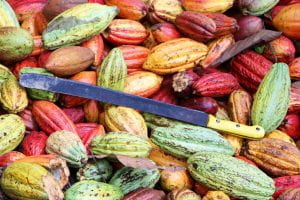One of my favorite staple breakfast items is a parfait, it is a quick and easy option for me in the early morning hours before I make my way to attending class. It feels wholesome and healthy with yogurt, granola, and a selection of chopped fruit layered at the top. The most prized fruits I take pleasure indulging in, are mangoes and kiwis. I pick them out of my fruit bowl on the counter, which was filled either after a simple trip to the grocery, or more commonly, after my bi-weekly Imperfect Produce delivery. More often than not, I pluck them out of my full, colorful bowl of fruits, ripened nearly to perfection. Once they have been laid out on my cutting board, skinned and sliced, the sweet juices flow and I’m filled with delight – dancing about, licking my fingers as I transfer my fruity gems to the top of my yogurt and granola mound. Once my breakfast has been taken in, I go to class, about my day, and that small delight fades as quickly as my dishes fall into the sink, and my mind shifts to the tasks for the day.

“Quick and easy,” sounds like a “non-humorous-things-seem-kind-of-fishy” type of funny, because up until my mangoes and kiwis were placed into my fruit bowl, nothing was quick and easy. It’s curious to me how almost all of us as US consumers, compartmentalize this process. We know that mangoes, kiwis, and other various tropical fruit production is limited to exactly that – the tropics. We know that the midwestern farmers and farm workers aren’t harvesting and growing bananas and star fruit. If you were to ask me, after taking a longing glimpse at my parfait, where did my fruit come from – I’d know they were from distant climates. Yet, even knowing this – knowing that if I were to travel to the farms of the kiwi and mangoes origins, it would be a full day or even more of traveling – I still compulsively think “quick and easy.”

I sat with myself for a while, just trying to imagine the whole process of my mangoes’ journey to my kitchen counter. How long does it take for a mango to grow? How much time, effort, and energy is a part of the process? What are the cultural aspects of mangoes has the mass production completely altered? And from there, how many different hands, trucks, forklifts, planes or other mechanisms played a role in the operations between its harvest and my fruit bowl. I had expected this exercise to be illuminating in a way that would inspire maybe a deeper appreciation, but in reality – it was exhausting. I felt bogged down and drained trying to trace back the steps of this single mango that I indulged in for maybe, 10 minutes. I think it’s not just that it’s easy for us to disassociate from the realities of production, because we are so far removed from having to face these realities. But that, the various loops and chains of production are so complex, fogged, and don’t present the idealized images of a happy farmer on a green pasture – we get caught in a cognitive bias. It’s hard to say if this was a structure built with the malicious intent of constructing a veil that is upheld by the inability to fully fathom its matrix of relationships, or if this just happens to be another unintended (but conveniently beneficial to those profiting) consequence of these extreme complexities.

I wonder how much would change if the realities were blared at us everyday. If the giant signs hanging above the fruit section didn’t imply a skewed version of the daily realities that take place all across the world, making it easy to assume that my mango’s migration has brought about no undesirable effects. Would we really continue to seek out our desires so freely? If it wasn’t as easy for us to disassociate from reality, would we work harder to avoid it? Or would something as simple and glorified as “awareness” bring about significant changes? It’s difficult to say, because even after this thought exercise, I don’t think I can promise that I won’t purchase another kiwi or mango. But, maybe instead – I/we can work a little harder to improve the conditions in which this system functions – to put this awareness beyond our dollars, and to really value lives over mangoes.














